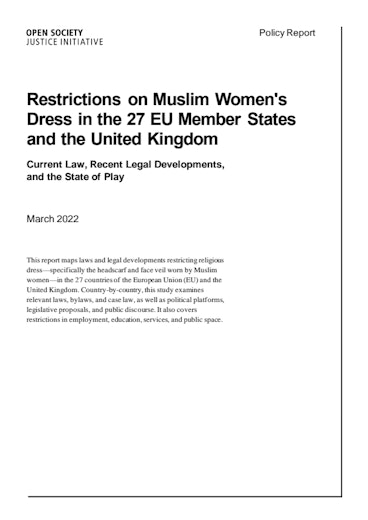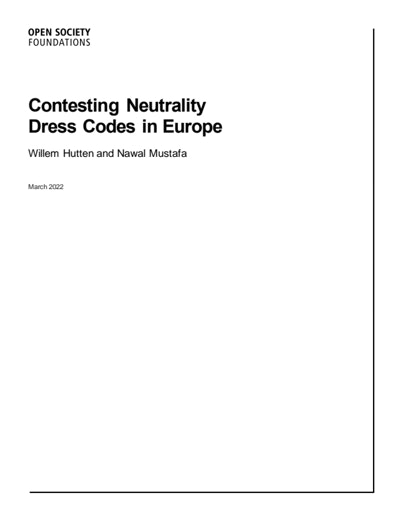Achbita v. Belgium
Many Muslim women in Europe are prevented from studying for, entering, and pursuing their chosen careers because of laws, policies and practices prohibiting the wearing of religious dress.
These restrictions are often introduced under the purported justification of “neutrality” and have been upheld by the Court of Justice of the European Union (“CJEU”) provided certain conditions are met, including that the restrictions are applied to all employees. This approach fails to recognize, however, the racialization of Muslims within a growing context of Islamophobia and that such ‘bans’ target and/or disproportionately impact Muslim women.
Facts
Samira Achbita is a Belgian citizen. In 2006, she was dismissed from her employment as a receptionist after having expressed her wish to wear an Islamic headscarf in the workplace.
Achbita’s employer, G4S Secure Solutions NV, argued that visibly political, philosophical, or religious signs would violate the company’s aspiration of “neutrality.” A written neutrality policy was put in place the day after Achbita’s dismissal.
Achbita filed a complaint with the Belgian Equality Body and pursued claims of discrimination through the Antwerp Labour Tribunal, Antwerp Labour Court and the Belgian Court of Cassation (the country’s highest Court). In 2015, the Court of Cassation stayed the legal proceedings and made a reference to the CJEU for a preliminary ruling on the correct application of the Equality Framework Directive 2000/78/EC, a key component of the EU’s labour law which prohibits discrimination on grounds of religion or belief.
In 2017, the CJEU found that G4S’s restriction did not constitute direct discrimination. It also found that such an internal rule may constitute indirect discrimination if it results in persons adhering to a particular religion or belief being put at a particular disadvantage, unless:
a) it is objectively justified by a legitimate aim, such as the pursuit by the employer, in its relations with its customers, of a policy of political, philosophical, and religious neutrality, and
b) the means of achieving that aim are appropriate and necessary. This included consideration of whether the policy was “general and undifferentiated” in respect of members of staff with customer contact and whether it would have been possible to offer Achbita a different post.
Following the CJEU’s ruling, the Court of Cassation upheld a previous refusal of Achbita’s claim of direct discrimination and referred the remainder of the case for a rehearing in Ghent Labour Court. In October 2020, Ghent Labour Court found that there was no indirect discrimination.
Open Society Justice Initiative Involvement
Together with the Human Rights and Migration Law Clinic of the Human Rights Centre at Ghent University, the Open Society Justice Initiative has submitted an individual complaint on behalf of Achbita to the United Nations Human Rights Committee.
Arguments
The complaint argues that Belgium has violated the International Covenant on Civil and Political Rights (“ICCPR”).
Freedom of religion (Article 18, ICCPR): Belgium failed to comply with its positive obligations to protect Achbita’s right to freedom of religion, which includes the right to freely manifest religion. In particular, the prohibition on wearing a headscarf constituted an infringement which was not justified under Article 18(3) of the Covenant, as it:
- was not prescribed by Belgian law;
- pursued illegitimate aims including preventing expressions of any one conviction in order to avoid being offensive to those with different opinions;
- was disproportionate, as it was absolute, permanent and gave rise to Achbita’s dismissal solely based on her refusal to remove her headscarf; and
- was discriminatory (see below).
Intersectional discrimination (Articles 3 and 26, ICCPR): The right to non-discrimination prohibits intersectional discrimination based on gender, race and religion. Belgium failed to protect the vulnerable, racialized group of which Achbita is a member. The purpose and effect of G4S’s actions was to target those who are visibly religious, and Muslim women in particular. This differential treatment was not objectively justified, as:
- “Neutrality” is not a legitimate aim of itself, as it is undefined and arbitrary;
- G4S’s actions were based on subjective factors such as stereotypes and assumptions that Muslim women wearing the headscarf are not neutral and/or pose a risk to the peaceful coexistence of different views; and
- it was not reasonable nor objective for the proportionality assessment to be restricted to considering whether Achbita could be placed in a back office. There was no consideration of alternative measures, such as requiring employees to treat each other’s beliefs with respect.
Effective remedy (Article 2(3), ICCPR): Belgium failed in its obligations to provide an effective remedy and to take necessary steps to prevent similar violations. To date, Achbita has not obtained any declaration of the violation of her rights nor any reparations.
Achbita files a complaint with the UN Human Rights Committee.
The Ghent Labour Court finds no indirect discrimination.
The Court of Cassation annuls Antwerp Labour Court’s judgment apart from the ruling on direct discrimination and refers the case to the Ghent Labour Court for retrial.
The Court of Justice of the European Union issues its preliminary ruling.
The Court of Cassation stays the proceedings and makes a referral to the CJEU for a preliminary ruling on Council Directive 2000/78/EC.
Achbita and Unia appeal to the Court of Cassation.
The Antwerp Labour Court rules that Achbita’s appeal is unfounded.
Achbita, joined by Unia, appeals to the Antwerp Labour Court.
The Antwerp Labour Tribunal dismisses Achbita’s claim.
The Belgian Equality Body, Unia, voluntarily intervenes in the proceedings in support of Achbita’s claim.
Achbita brings an action against G4S in Antwerp Labour Tribunal.
G4S dismisses Achbita from her employment.
Achbita begins employment with G4S.
Related Work
Restrictions on Muslim Women's Dress in the 27 EU Member States and the United Kingdom
This policy brief and accompanying fact sheet map EU and UK laws and pending legislation restricting religious dress—specifically the headscarf and face veil worn by Muslim women.

Contesting Neutrality Dress Codes in Europe
This briefing paper aims to support Muslim women, campaigners, litigators, and other stakeholders challenging discriminatory and exclusionary religious dress bans by deconstructing the concept of neutrality and analyzing its treatment by various courts.

Religious Dress Restrictions Are Unlawful, Not “Neutral,” Argues the Justice Initiative
The Justice Initiative, together with co-counsel, the Human Rights Centre at Ghent University, have filed a complaint against Belgium with the UN Human Rights Committee, arguing that religious dress restrictions are discriminatory against Muslim women.